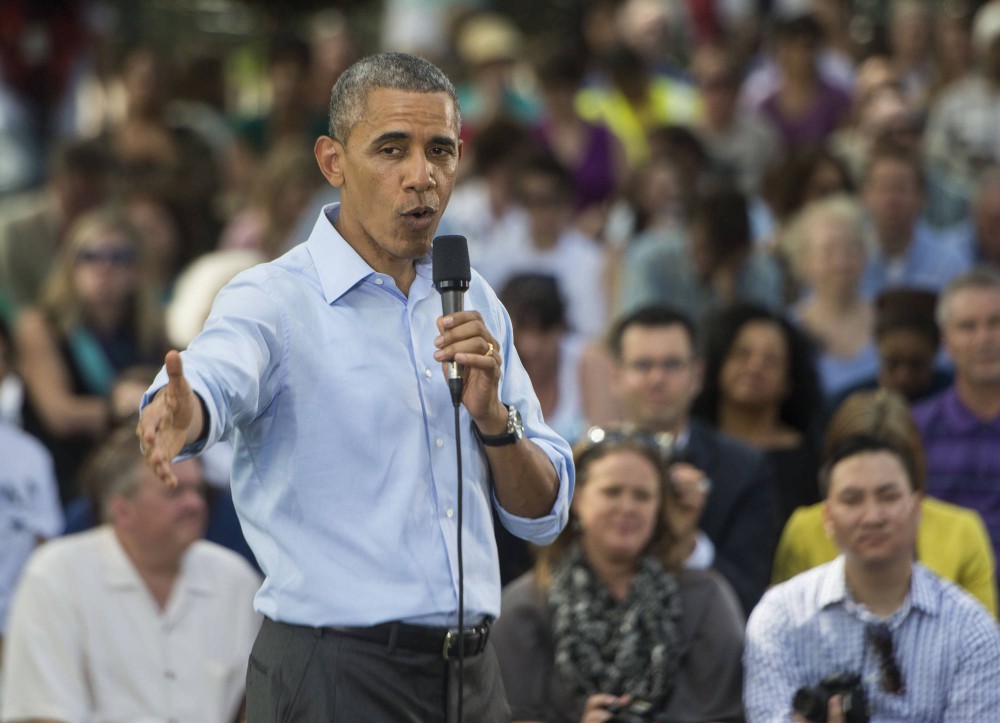With a Minneapolis park for a backdrop and an enthusiastic crowd of Minnesotans cheering him on, President Barack Obama called out Republicans for blocking his national agenda.
During his two-day visit to the Twin Cities last week, the president touted Minnesota policy initiatives and leadership while trying to energize potential voters for the state’s upcoming elections in November.
“I’m here to tell you I’m listening because you’re the reason I ran for president,” Obama told the crowd of about 3,500 people at the Lake Harriet Band Shell on Friday morning.
Even though the president received a seemingly warm Minnesota welcome, some people criticized the visit, citing unproductive blame on Republicans and a worn-out message.
The trip, which is Obama’s seventh to the state, was inspired by Minnesotan Rebekah Erler, who wrote to the president about her family’s financial struggles. On Thursday, the president grabbed a burger with her at Matt’s Bar in south Minneapolis to discuss her concerns.
And in his addresses on Thursday and Friday, the president championed the middle class, highlighting issues like minimum wage and student loans.
“We know from our history that our economy does not grow from the top down; it grows from the middle out,” Obama said to the crowd on Friday. “We do better when the middle class does better.”
Minnesota Democratic-Farmer-Labor Chair Ken Martin said the president’s Twin Cities visit was not surprising considering the state’s recently passed legislation to reduce the gender pay gap, legalize same-sex marriage and raise the minimum wage.
While Obama lauded the state’s progress, he blamed the GOP for setting him back. He said the party’s members blocked or voted down issues that he was pushing to “strengthen the middle class.”
Minnesota Republican Party Chair Keith Downey said the vocal criticism of Republicans runs counter to their message of compromise.
“[Obama] has got to find a way to work with Congress instead of blaming Republicans,” Downey said. “You can’t spend your entire eight years in office blaming other people for your problems.”
Matthew Boelke, president of the College Republicans at the University of Minnesota, agreed and said the checks and balances between parties and agendas are an integral part of governance.
“[You have] to make sure you’re passing good laws,” Boelke said, “and not just steamrolling the opposition to get whatever you want passed.”
Obama closed his speech Friday with the same message of hope he campaigned with six years ago.
“I know that our politics look profoundly broken, and Washington looks like it’s never going to deliver for you. … I get that frustration,” he said. “Cynicism is a choice, and hope is a better choice.”
But Downey said it’s a worn-out message.
“The president is still trying to sell the ‘hope and change’ message with a lack of results,” Downey said
Garnering votes for the Democratic Party
Some people are considering Obama’s visit an effort to rally support for Democratic candidates running in the state’s upcoming election.
On Thursday evening, the president attended a private fundraiser, where individual tickets cost at least $10,000, for the Democratic Congressional Campaign Committee.
Eric Ostermeier, a fellow at the Center for the Study of Politics and Governance at the Humphrey School of Public Affairs, said Obama’s visit was an intentional effort to garner votes for fellow members of the Democratic Party.
“Nationally, he’s flirting with a low 40 percent approval rating,” Ostermeier said. “He’s not here drawing support for himself. … It’s wise to focus on these issues if he wants to move the needle for the Democratic candidates who will be campaigning on these issues as well.”
Martin said he was glad the president used Minnesota legislation to give momentum to similar initiatives across the country.
Top Democratic politicians in Minnesota, including Rep. Keith Ellison, Sen. Amy Klobuchar, St. Paul Mayor Chris Coleman and Gov. Mark Dayton, attended Thursday’s and Friday’s events — but Downey, the state GOP party chair, was quick to point out the absence of Sen. Al Franken.
“The fact that Franken did not show up says a lot,” Downey said, citing the senator’s recent 50 percent approval rating. “Al Franken didn’t want to be anywhere near the president in front of the people of Minnesota, whose votes he’s going to ask for in November.”
But former Minneapolis Mayor and vice chair of the Democratic National Committee R.T. Rybak said he was encouraged that the crowd’s energy would translate into member turnout for the November elections.
“I think that we recognize showing up in November means joining a battle the president has fought in and succeeded in spite of incredible odds,” he said.
Highlighting higher education
During his town hall talk Thursday afternoon at Minnehaha Park, the president fielded questions from an intimate crowd comprising media, elected officials and people from invited local businesses and organizations.
Minnesota Student Association President Joelle Stangler attended and asked the president how he plans to garner bipartisan support for the reauthorization of the Higher Education Act.
As part of higher education reform, Obama said he wants to hold colleges and universities more accountable for being transparent about tuition costs.
“The federal government can help, but states and local government have to do their part as well,” he said in response to Stangler.
While Obama pushed a variety of issues during his Twin Cities visit, the president’s main message was urging people from both sides of the aisle to support his initiatives.
“Why don’t you join me and we’ll do it together?” he said Friday. “I want to work with you, but you’ve got to give me something. You’ve got to try to deliver something — anything.”













